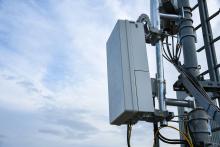The same process is repeated as the products arrive at Wal-Mart's seven stores, confirming that the shipments are now in the each store's back room. Individual products are then stocked as needed.
Consumers, in general, will not come in contact with RFID tags, since most of the devices are used on wooden pallets and shipping cartons. Large electronic items, however, could have the tags on their packaging, including three Hewlett-Packard products -- two Photosmart computer printers and a ScanJet scanner -- that arrived at Wal-Mart stores on Friday.
Consumer groups have raised privacy concerns, saying RFID tags on individual products could one day be used to collect information on shoppers. Some state lawmakers have introduced bills to regulate the use of the technology.
In California, a proposal by state Sen. Debra Bowen passed the Senate this week and is headed for the Assembly. The bill would require companies to tell customers that an RFID system is in use and get permission before tracking and collecting information. The bill also requires businesses to detach or destroy product-attached RFID tags before the customer leaves the store.
To allay wary consumers, Wal-Mart will have signs in the seven Dallas-area stores notifying customers of the tags on the HP products. Pamphlets also will be placed on the shelves and aisles, alerting customers that they can have the tags removed at purchase.








